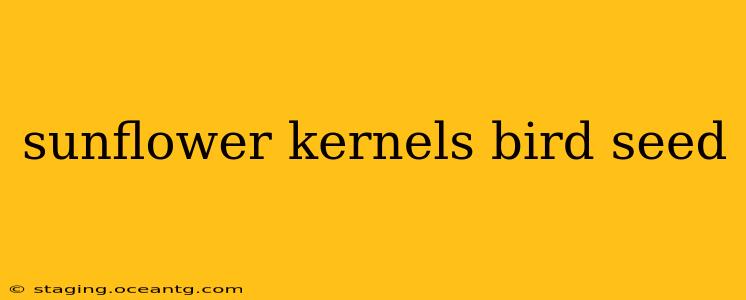Sunflower kernels are a popular and readily available choice for birdseed, loved by both backyard bird enthusiasts and the feathered friends themselves. But are they the perfect bird seed? This comprehensive guide delves into the benefits, drawbacks, and considerations of using sunflower kernels as a primary food source for your avian visitors.
What Makes Sunflower Kernels Appealing to Birds?
Sunflower kernels are packed with nutrients crucial for bird health. They are a rich source of healthy fats, proteins, and essential vitamins and minerals. This makes them an excellent energy source, particularly important during colder months or breeding season when birds need extra fuel. The high oil content also helps birds stay warm in harsh weather conditions. Different types of sunflower seeds offer varying levels of these nutrients, with black oil sunflower seeds generally considered the most nutritious option for birds.
Are Sunflower Kernels the Only Seed Birds Need?
While sunflower kernels are a fantastic addition to any bird feeder, they shouldn't be the sole food source. A balanced diet is key to a bird's overall health and well-being. Offering a variety of seeds, nuts, fruits, and suet ensures birds receive a wide range of essential nutrients. Over-reliance on sunflower seeds can lead to nutritional deficiencies.
What Types of Birds Enjoy Sunflower Kernels?
A wide variety of birds enjoy sunflower kernels, making them a versatile choice for attracting diverse species to your backyard. Some of the most common visitors include:
- Cardinals: These vibrant birds are particularly fond of sunflower seeds.
- Chickadees: These smaller birds are adept at cracking open the shells.
- Blue Jays: These larger birds appreciate the high-calorie content.
- Finches: Many finch species happily consume sunflower seeds.
- Doves: Doves enjoy the larger kernels.
Are There Different Kinds of Sunflower Seeds for Birds?
Yes! The most common types used in birdseed are:
- Black oil sunflower seeds: These are smaller, thinner-shelled, and higher in oil than striped sunflower seeds. They are a favorite among many bird species.
- Striped sunflower seeds: These have a thicker shell, making them more challenging for smaller birds to crack open. However, they are also a good source of nutrients.
- In-shell vs. shelled: Offering both in-shell and shelled seeds caters to a broader range of birds, with some preferring the challenge of cracking open the shell themselves.
How Do I Properly Store Sunflower Kernels for Birds?
Storing sunflower seeds correctly helps prevent spoilage and keeps them fresh for your feathered friends. Keep them in a cool, dry place, away from direct sunlight and moisture. Airtight containers are ideal to maintain freshness and prevent pests.
What are the disadvantages of using only sunflower seeds?
While beneficial, relying solely on sunflower kernels can create some problems:
- Nutritional imbalance: Lack of diversity can lead to nutritional deficiencies in birds.
- Waste: Unshelled seeds can create a mess around the feeder.
- Attracting unwanted guests: An abundance of high-energy food can attract unwanted rodents or other animals.
Can sunflower kernels attract unwanted pests?
Yes, an overabundance of sunflower seeds can attract unwanted pests like rodents or insects. It's crucial to maintain a clean feeding area and avoid overfilling feeders to mitigate this risk. Regularly cleaning up spilled seeds helps as well.
What other foods should I offer birds alongside sunflower kernels?
To create a balanced diet, consider offering a mix of different seeds, nuts (like peanuts), dried fruits, berries, and suet. This variety caters to different bird species' nutritional needs and preferences. Consider offering mealworms or other insects for added protein.
In conclusion, while sunflower kernels are a valuable and attractive food source for many birds, they shouldn't be the only item on the menu. A balanced and varied diet is crucial for the health and well-being of your avian visitors. By offering a diverse selection of foods, you can create a thriving and vibrant backyard ecosystem.
